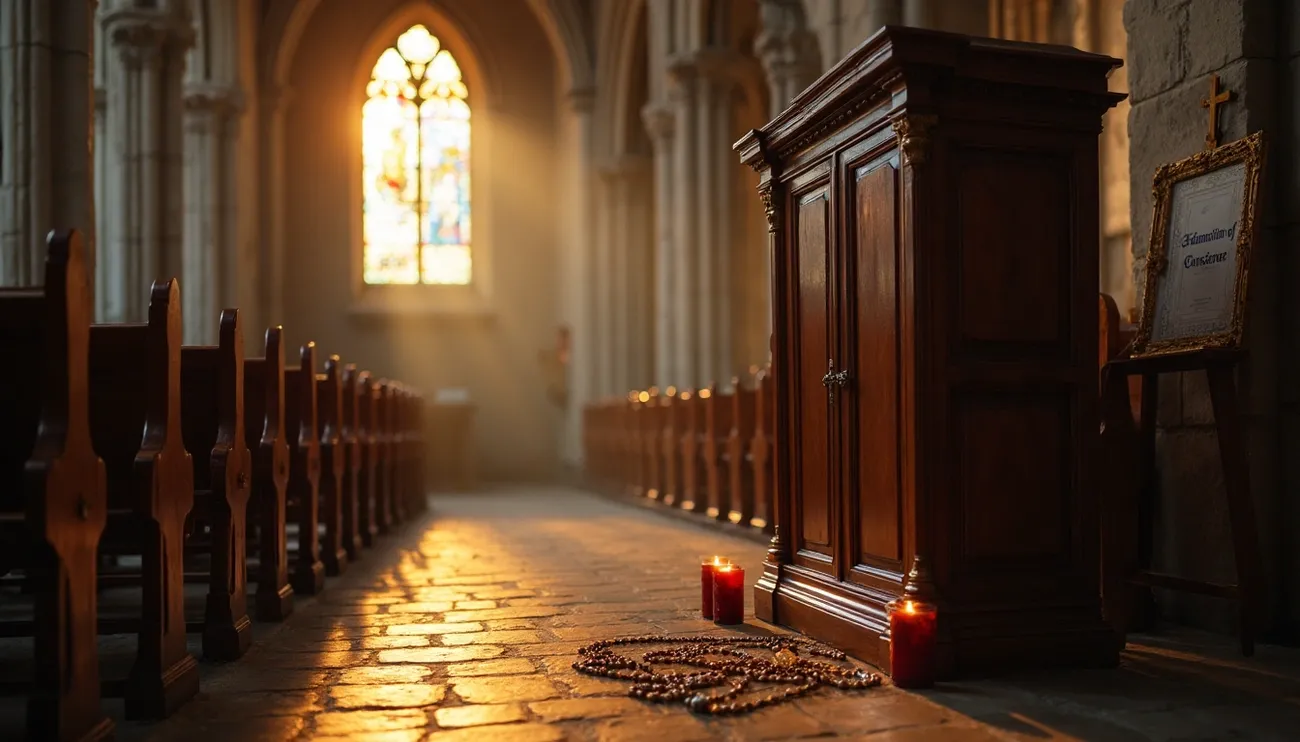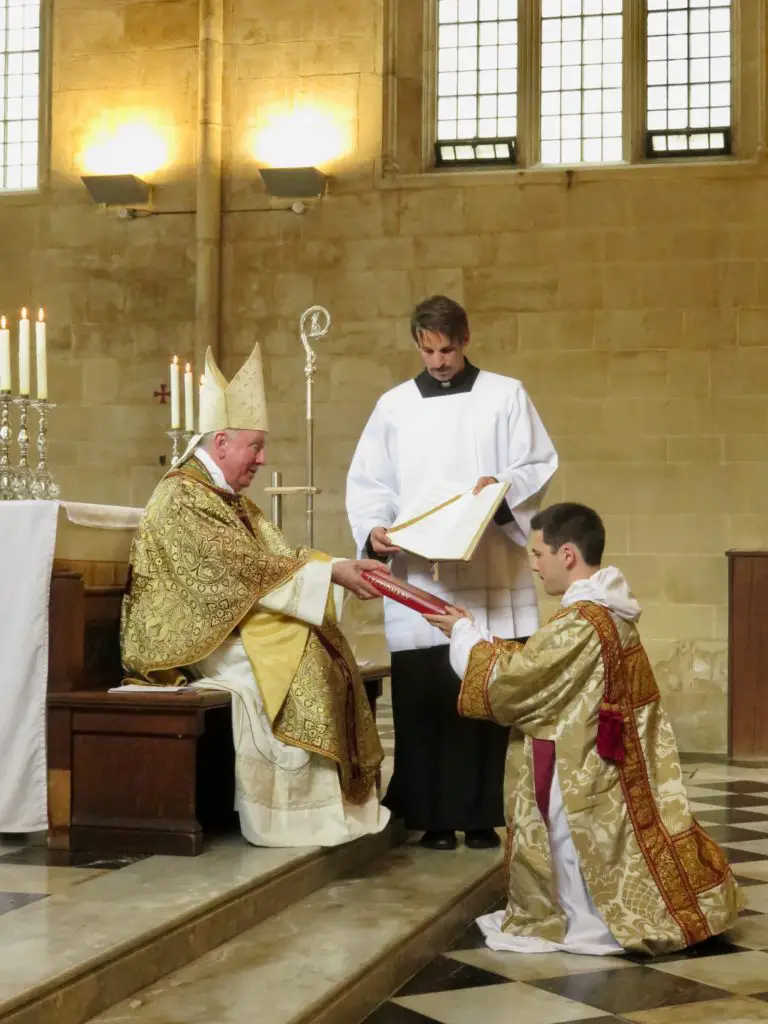How to understand and make a good Confession? (A Guide to Reconciliation)
Did you know that the Sacrament of Reconciliation is the only ordinary means by which mortal sins committed after Baptism may be forgiven? As Catholics, we believe this profound truth that shows the extent of God’s mercy toward His children.
The Church teaches that sin manifests in two forms: mortal and venial. For a sin to be considered mortal, three specific conditions must be met:
i) the matter must be grave in nature,
ii) it must be committed with full knowledge of its sinfulness, and
iii) it must be done with complete consent of the will.
Yet regardless of sin’s severity, the path to reconciliation remains accessible through this beautiful sacrament.
I have observed that many Catholics in our modern world struggle with confession precisely because society has increasingly lost its sense of sin. Throughout the Scriptures, we see that a stronger awareness of sin leads to a greater appreciation for the Sacrament of Penance. This gift from God provides healing through four essential elements: Contrition, Confession, Penance, and Absolution.
What makes this sacrament particularly powerful?
The peace and serenity of conscience that typically follows a good confession. The soul, once burdened by sin, experiences the lightness of God’s forgiveness and mercy.
Through this guide, I will walk you through not only the process of confession but also how to conduct a thorough examination of conscience. This examination covers your thoughts, words, and actions that did not conform to God’s commandments as revealed through Scripture and Church teaching.

Whether you are returning to the confessional after many years or seeking to deepen your regular practice, my hope is that this guide will help you experience the healing power of this beautiful sacrament that Christ Himself instituted for our spiritual well-being.
How to Understand Sin and the Why the Need for Confession?
Sin lies at the very heart of Catholic theology. The Catechism defines it as:
“an offense against reason, truth, and right conscience; it is failure in genuine love for God and neighbor caused by a perverse attachment to certain goods”.
Moreover, it describes sin as:
“an utterance, a deed, or a desire contrary to the eternal law”.
Understanding the nature of sin helps us appreciate why the Sacrament of Confession exists as a gift from God to His people.
What is sin and why it matters?
What does sin truly represent in our spiritual lives? Sin is not merely the breaking of rules or regulations; rather, it damages our relationship with God and wounds our connection with others. The Catechism clearly explains that sin:
“wounds the nature of man and injures human solidarity”.
When we sin, we choose something lesser than God, turning away from our true purpose and happiness.
Sin matters profoundly because it represents a rejection of God’s perfect love. As St. Thomas Aquinas taught with great wisdom, sin is “a privation of conformity to right reason and to the law of God”. This rejection has real consequences—it diminishes our capacity to love authentically and disrupts our communion with God and His Church.
Modern society often dismisses the reality of sin, yet without recognizing sin, we cannot fully appreciate God’s mercy and forgiveness through the Sacrament of Reconciliation.
What is the difference between mortal and venial sins?
The Catholic Church distinguishes between two types of sins based on their gravity and effects on the soul:
Mortal Sin requires three specific conditions:
Grave matter – The act itself must be seriously wrong
Full knowledge – The person must know it is sinful
Deliberate consent – The person must freely choose to do it
Actions like murder, adultery, and theft of significant value are considered grave matter. Mortal sin “destroys charity in the heart of man by a grave violation of God’s law; it turns man away from God”. Consequently, it deprives us of sanctifying grace and, if unrepented, leads to eternal separation from God.
Venial Sin occurs when:
The matter is less serious, or
One of the three conditions for mortal sin is missing
Examples include telling white lies or moments of impatience. Venial sin “allows charity to subsist, even though it offends and wounds it”. While less severe, venial sins still weaken our relationship with God and can gradually lead to more serious sins if ignored.
Why confession is necessary for Catholics?
Why has the Church consistently taught the necessity of confession? The answer lies in both divine institution and spiritual reality.
The Church teaches that “individual and integral confession and absolution is the only ordinary way in which a person conscious of mortal sins committed after baptism can be reconciled with God and the church”. This teaching comes directly from Christ Himself.
After His resurrection, Jesus appeared to the Apostles, breathed on them, and said:
“Receive the Holy Spirit. If you forgive men’s sins, they are forgiven them; if you hold them bound, they are held bound” (John 20:21-23).
Through these words, Christ instituted the Sacrament of Reconciliation and gave the Church the authority to forgive sins in His name.
Additionally, confession is necessary for several spiritual reasons:
It restores sanctifying grace lost through mortal sin
It provides the grace to avoid future sin
It allows for spiritual guidance and healing
The Church requires that “after having reached the age of discretion, each member of the faithful is obliged to confess faithfully his or her grave sins at least once a year”. This yearly confession is especially important before receiving Communion during the Easter season.
A more frequent confession is recommended as it helps us grow in self-knowledge and deepens our relationship with Christ. Through this beautiful sacrament, we can be certain that God has forgiven us and helps us return to full communion with Him and His Church.
How to preparing Your Soul for the Sacrament of Reconciliation?
Preparing for a fruitful confession is not merely about compiling a list of sins but rather opening your heart to God’s transforming grace. This preparation serves as the foundation for experiencing the full healing power of this sacrament.
1) Begin with Prayer for Divine Guidance
Before examining your conscience, spend time in prayer asking for the Holy Spirit’s assistance. Prayer creates the proper disposition for recognizing your sins honestly and completely.
A beautiful prayer to begin with:
“Come Holy Spirit into my soul. Enlighten my mind that I may know the sins I ought to confess, and grant me Your grace to confess them fully, humbly, and with a contrite heart. Help me to firmly resolve not to commit them again.”
Many of the faithful find this simple yet powerful prayer helpful:
“O my God, I don’t want to lose my soul. Help me realize my sins. Give me the light to know my sins, true sorrow for them, and a firm purpose of never committing them again.”
2) Conducting a Thorough Examination of Conscience
Following your prayer, embark upon a thorough self-examination. This crucial step involves reflecting on your actions, words, thoughts, and omissions since your last confession.
To conduct an effective examination:
Find a quiet place free from worldly distractions
Set aside proper time (15-30 minutes for regular confession)
Consider having a pen and paper to note sins as they come to mind
Use an examination guide from a reliable Catholic source
Be honest with yourself—neither exaggerating nor minimizing your faults
Find an Examination of Conscience tailored to different life situations, including those for children, young adults, single people, and married persons.
3) The Ten Commandments as Your Mirror
The Ten Commandments offer an excellent framework for examining your conscience. Each commandment opens a window into different aspects of your relationship with God and with your neighbor.
When reflecting on each commandment, consider not only external actions but also internal dispositions. For instance, under “You shall not kill,” contemplate not just physical harm but also anger, resentment, and emotional wounds you may have caused. Under “You shall not steal,” examine whether you’ve wasted time at work or school.
Let us consider that this reflection extends beyond merely avoiding evil—it involves growing in virtue. Ask yourself not only “What have I done wrong?” but also “How have I failed to do good?”
4) The Essential Role of Contrition
Contrition—sincere sorrow for sins—stands as the most critical element of confession. Without genuine contrition, the confession is invalid.
The Catholic Church recognizes two types of contrition:
Perfect contrition: Sorrow arising from love of God above all else
Imperfect contrition: Sorrow born from other motives, such as fear of hell or recognition of sin’s inherent ugliness
Both forms are sufficient for the sacrament, though perfect contrition represents the ideal.
The traditional Act of Contrition beautifully expresses this sorrow:
“O my God, I am heartily sorry for having offended you, and I detest all my sins because of your just punishments, but most of all because they offend you, my God, who are all good and deserving of all my love.”
Through this prayer, you express not only regret for past actions but also a firm commitment to avoid sin in the future. This resolution completes your preparation, making you ready for the healing encounter with Christ through His priest.
How to practice the Sacrament of Reconciliation: A Practical Guide?
Walking into the confessional might feel intimidating for many Catholics, especially those returning after many years. Let us consider what happens during this sacred encounter with Christ through His priest.
I) The Setting: Face-to-Face or Behind the Screen
The Church, in her wisdom, provides two options for receiving this sacrament: face-to-face or behind a screen. According to Church law, both the priest and penitent have the right to opt for the screen if either finds it more comfortable.
Many of the faithful appreciate anonymous confession as it helps them focus more on Jesus and less on social interactions. The screen option can enhance the freedom of both penitent and confessor to be completely honest. Face-to-face confession, alternatively, allows for more personal interaction. The Church requires that confessionals still provide an opaque screen option for those who prefer anonymity.
Choose whichever setting helps you be most honest and comfortable in this sacred encounter.
II) Beginning Your Confession
Once you’ve chosen your preferred setting, follow these steps to begin:
Make the Sign of the Cross together with the priest
Say: “Bless me Father, for I have sinned. It has been [length of time] since my last confession”
Some parishes provide prayer guides in the confessional to assist if needed
The priest will typically welcome you with warmth and compassion. Should you feel nervous – which is natural – simply tell the priest, and he will guide you through the process.
III) Confessing Your Sins with Clarity and Humility
After this introduction, confess all your sins with honesty and contrition:
Mention all mortal sins by number and kind as best you can recall
Include venial sins, though these aren’t strictly required for valid confession
If uncertain or uneasy, ask the priest for guidance
You may write down sins beforehand to ensure you remember them
When you have finished, conclude with: “I am sorry for these and all my sins”. Remember that you are speaking to Christ Himself through the priest. The seal of confession ensures complete confidentiality – the priest cannot reveal what you’ve shared to anyone under any circumstances.
IV) The Gift of Penance and Absolution
Following your confession, the priest will:
Offer spiritual counsel and guidance
Assign a penance – prayers, reflections, or charitable works
Ask you to pray the Act of Contrition
The Act of Contrition expresses your sorrow for sins. A common version begins:
“O My God, I am very sorry that I have sinned against you, because your are so good and with your help, I will not sin again”.
This beautiful moment culminates when the priest extends his hands over your head and pronounces the words of absolution. The essential words that effect the forgiveness are:
“I absolve you from your sins in the name of the Father, and of the Son, and of the Holy Spirit”.
The priest may conclude with “Give thanks to the Lord, for he is good,” to which you respond, “His mercy endures forever”. Through this sacred moment, God’s forgiveness touches your soul directly and tangibly.
What a beautiful gift Christ has given us in this sacrament! Through it, we experience His mercy in a most personal and transformative way.
How to Examination your Conscience as guided by the Ten Commandments?
A thorough examination of conscience using the Ten Commandments provides the foundation for a fruitful confession. As Catholics, we believe these divine commandments offer a clear mirror in which to see our souls. Let us consider how these commandments can guide our self-reflection.
1. I am the Lord your God
What does our relationship with God truly look like? Ask yourself: Have I placed other “gods” before the one true God? Have I engaged in superstitious practices like consulting horoscopes or fortune-tellers? Have I given greater importance to money, career, or possessions than to my relationship with God? Have I neglected daily prayer or failed to nourish my faith? Have I deliberately withheld confessing mortal sins in previous confessions?
2. You shall not take the Lord’s name in vain
Our speech reveals much about our reverence for God. Reflect on whether you have used God’s holy name carelessly or as a curse word. Have you spoken mockingly of sacred persons or objects? Have you broken promises or vows made to God? Have you expressed anger toward God rather than seeking His wisdom in difficult times? Have you blasphemed or insulted God?
3. Keep holy the Lord’s Day
The Church teaches that Sunday worship is not optional but essential for our spiritual well-being. Consider if you have missed Sunday Mass or Holy Days of Obligation through your own fault. Have you arrived late or left early without good reason? Have you treated Sunday as merely another workday? Have you failed to make Sunday a day of rest, prayer, and family time? Have you shown proper reverence in church?
4. Honor your father and mother
Our family relationships reflect our understanding of God’s authority. Ask yourself: Have I disobeyed or disrespected my parents? Have I neglected family duties? Have I failed to care for elderly relatives? Have I given poor religious example to my family? Have I shown disrespect to those in legitimate authority?
5. You shall not kill
The Gospel calls us to respect all human life. Examine whether you have harbored hatred or refused to forgive others. Have you caused physical or emotional harm? Have you judged others based on prejudice? Have you supported practices that destroy human life such as abortion or euthanasia? Have you abused alcohol or drugs? Have you endangered your life or others’ through reckless behavior?
6. You shall not commit adultery and 9. You shall not Covet your neighbor’s Wife
These commandments call us to purity in thought and deed. Reflect honestly: Have you committed adultery or fornication? Have you used contraception or artificial birth control against Church teaching? Have you viewed pornography or impure media? Have you entertained impure thoughts or desires? Have you dressed immodestly or spoken in ways that dishonor the gift of sexuality?
7. You shall not steal and 10. You shall not covet your neighbor’s goods
Justice demands respect for others’ property and contentment with what God has provided. Ask yourself: Have you stolen or damaged others’ property? Have you cheated in business, school, or games? Have you failed to return borrowed items? Have you envied others’ possessions? Have you wasted resources or time that belonged to your employer?
8. You shall not bear false witness
Truth is sacred, as our Lord is the Way, the Truth, and the Life. Examine whether you have lied or exaggerated the truth. Have you gossiped or revealed others’ faults without necessity? Have you damaged someone’s reputation? Have you betrayed confidences? Have you made rash judgments about others?
I highly recommend conducting this examination in a quiet place, perhaps before the Blessed Sacrament if possible. Take your time with each commandment, allowing the Holy Spirit to illuminate areas of your life that need healing and conversion. Remember that this examination is not meant to discourage but to help you recognize God’s infinite mercy awaiting you in the confessional.
V) After Confession: Living a Renewed Life
The Sacrament of Reconciliation offers more than just forgiveness—it provides an opportunity for profound spiritual renewal. What happens after we leave the confessional is just as important as what happens within it. Let us consider how to nurture the grace received through this beautiful sacrament.
A) Performing your penance
I highly recommend finding a quiet place immediately after leaving the confessional to complete your assigned penance. This sacred duty should be fulfilled as soon as possible, though if you honestly forget, be assured that your confession remains valid. The priest assigns a penance that takes into account your personal situation—it might be prayers, works of mercy, service to others, or acts of self-denial.
The penance serves multiple spiritual purposes:
It helps repair the damage caused by sin
It demonstrates the sincerity of your sorrow
It begins the process of healing your soul
As the Catechism teaches,
“Raised up from sin, the sinner must still recover his full spiritual health.”
Your penance, though simple in appearance, is joined to Christ’s redemptive sacrifice on the Cross, making it powerful beyond your own abilities.
B) Making a firm resolution to avoid sin
What does a genuine commitment to avoid future sin look like? To understand this, we must first identify the root causes of our sinful patterns:
- Examine which situations typically lead to temptation
Develop specific strategies to avoid near occasions of sin
Replace negative behaviors with virtuous alternatives
Pray daily for strength against particular weaknesses
I would not do it any justice if I failed to mention the importance of a brief examination of conscience each evening. This practice allows us to reflect on our successes and failures throughout the day. As St. Francis de Sales wisely noted, “In this war, we are always victorious provided that we are willing to fight.”
C) Returning regularly to the sacrament
According to Church teaching, Catholics are obliged to receive the Sacrament of Reconciliation at least once yearly. However, more frequent confession—monthly or even bi-weekly—provides tremendous spiritual benefits that cannot be overstated.
Regular confession yields multiple fruits in the spiritual life:
Increases self-knowledge
Grows Christian humility
Corrects bad habits
Strengthens willpower against temptation
Increases sanctifying grace in the soul
Throughout my years as a Catholic, I have witnessed firsthand how this sacrament becomes not merely a requirement but an opportunity to experience God’s boundless mercy. Those who make light of frequent confession miss tremendous opportunities for spiritual growth.
Ultimately, confession isn’t about fulfilling an obligation—it’s about ongoing conversion and deepening our relationship with Christ. The regular practice of this sacrament gradually transforms us into the saints we are called to be.
Conclusion
Throughout this guide, we have explored the profound gift of Confession that Christ has given to His Church. This sacrament truly stands as one of the most beautiful expressions of God’s mercy available to us as Catholics. The peace that follows a sincere confession cannot be found elsewhere in our earthly journey.
First and foremost, remember that Confession heals our relationship with God, restores sanctifying grace, and strengthens us against future temptation. I have witnessed countless souls enter the confessional with anxiety and leave with overwhelming relief. This transformation occurs because God truly works through the priest to absolve our sins completely.
The four essential elements we discussed—Contrition, Confession, Penance, and Absolution—create the pathway back to spiritual wholeness. Each step matters profoundly. Without genuine contrition, the sacrament lacks its foundation. Without honest confession, healing remains incomplete. Without fulfilling our penance, our reconciliation lacks closure. The absolution we receive, however, remains perfectly effective regardless of our feelings.
Regular confession helps us grow in self-awareness and humility. Many saints throughout Church history advocated frequent confession not just for mortal sins but also to address venial sins that gradually weaken our spiritual life. St. Francis de Sales, St. Alphonsus Liguori, and St. Padre Pio all spoke of confession’s transformative power when practiced regularly.
The examination of conscience based on the Ten Commandments provides a timeless framework for preparing ourselves. By returning to confession with sincerity, we experience God’s mercy anew each time. Let us embrace this sacrament not as a burden but as the tremendous gift it truly is—our direct encounter with Christ the Divine Physician who heals our wounded souls.
I highly recommend making confession a regular part of your spiritual practice. The graces received through this sacrament are immeasurable, and the peace it brings to the soul cannot be obtained through any worldly means. Praise God for His mercy and justice, which meet perfectly in the confessional.
FAQs
Q1. What are the essential elements of a Catholic confession? The four essential elements of a Catholic confession are Contrition (sincere sorrow for sins), Confession (honest disclosure of sins), Penance (acts assigned by the priest for spiritual healing), and Absolution (forgiveness granted by the priest in God’s name).
Q2. How often should Catholics go to confession? While Catholics are required to confess at least once a year, more frequent confession—such as monthly or bi-weekly—is highly recommended for spiritual growth, increased self-awareness, and a deeper relationship with Christ.
Q3. What’s the difference between mortal and venial sins? Mortal sins are grave offenses against God that meet three conditions: serious matter, full knowledge, and deliberate consent. They destroy charity in the heart. Venial sins are less serious offenses that weaken our relationship with God but don’t completely break it.
Q4. How should I prepare for confession? Prepare by praying for guidance, conducting a thorough examination of conscience (often using the Ten Commandments as a framework), reflecting on your sins since your last confession, and cultivating genuine contrition for your offenses.
Q5. What happens after confession? After confession, you should perform your assigned penance as soon as possible, make a firm resolution to avoid future sin, and consider implementing regular self-examination. Many Catholics find that living a renewed life includes returning to the sacrament regularly for continued spiritual growth.






